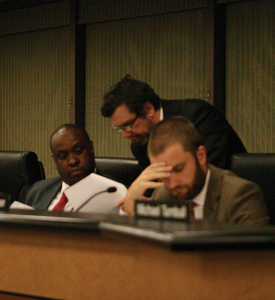
After almost a year of hearings, zoning commissioners failed to come to a decision about the 2010 Campus Plan Thursday night.
The D.C. Zoning Commission decided to delay its ruling on the university’s 2010 Campus Plan until April at what was intended to be the sixth and final hearing on the plan Thursday night.
The meeting was the third time the commission has put off announcing a final verdict on the plan, which was originally slated for a vote in June of last year.
At the meeting, commissioners said that they were still uncertain about the effectiveness of measures the university has implemented in the past year to address neighborhood grievances. The commission agreed to reconvene April 30, delaying its final ruling until data from the entire academic year becomes available.
“I think it was a bit disappointing that they decided to postpone,” Georgetown University Student Association Vice President Greg Laverriere (COL ’12) said after attending the meeting. “But I think they want to do their due diligence and make sure they have their facts right, which is commendable.”
Though they reiterated neighborhood concerns, commissioners also said they were reluctant to force Georgetown to house all of its undergraduate students on university-owned property. The Advisory Neighborhood Commission 2E, Burleith Citizens Association and Citizens Association of Georgetown have consistently demanded such a policy.
“Requiring the university to house 100 percent of its undergraduates on campus is something in my book [that] I’m not sure is reasonable or achievable,” Commissioner Andrew May said.
But commissioners also agreed that the current presence of students in the neighborhood is unacceptable.
“The university has to come up with a better solution for off-campus housing so we can lessen some of the impacts on the surrounding area,” Commission Chairman Anthony Hood said.
May suggested that the university find a way of making the option to live off-campus a privilege that students must earn, rather than a right.
“It’s the university’s responsibility to find a better solution,” Hood said.
University spokeswoman Stacy Kerr said that while the university stands by the measures it has adopted to date, it is eager to continue the search for creative solutions to neighborhood concerns.
“Being a good neighbor is a responsibility we take very seriously, as evidenced by the many resources we have voluntarily put into improving the quality of life for our near neighbors and for our entire community,” Kerr wrote in an email. “We look forward to continuing to engage in conversations that result in mutually beneficial solutions for all of the stakeholders involved.”
Zoning Commission Vice-Chairman Konrad Schlater attempted to shift some of the blame away from the university, stressing that while it is responsible for ensuring all stakeholders are satisfied, municipal services must also play an active role in addressing neighborhood concerns.
“We need better coordination with the [District Department of Transportation] for parking enforcement and the [Department of Public Works] for trash enforcement,” Schlater said. “When you have a house that’s leaving trash, that is the responsibility of [the] District government.”
Schlater added that the commission should exercise caution in restricting the university’s ability to grow.
“It bears repeating that Georgetown is the largest private employer in D.C.,” he said. “When unemployment is high, economic impact from this university is very high, so when we’re talking about the expansion of the professional schools and the graduate school and graduate students, along with that comes jobs, and that’s something I want to make sure we keep in mind.”
Laverriere said he was encouraged by Schlater’s testimony and hopes that the commission will come to a decision soon so that the university can move forward with the projects proposed in the plan.
“The university needs this issue to be resolved at some point,” he said. “The longer we hold this up, the longer it’s going to be before we can start with everything we want to do in this plan.”














